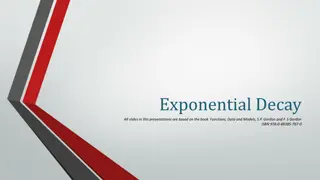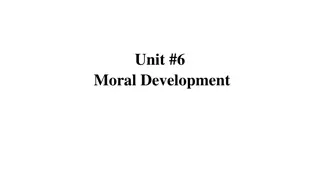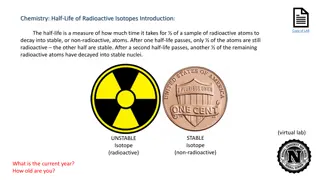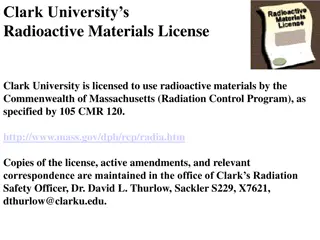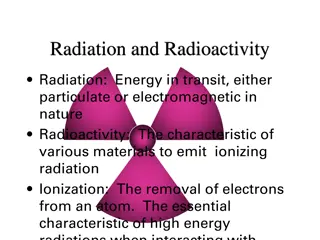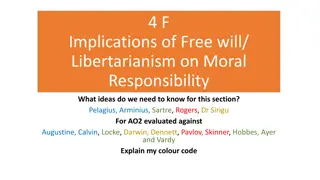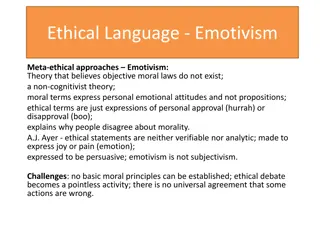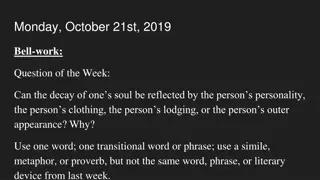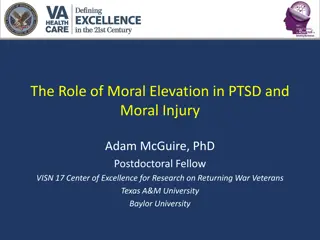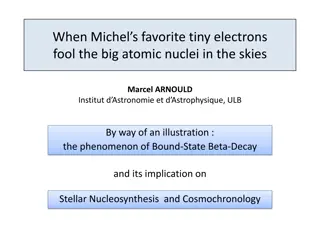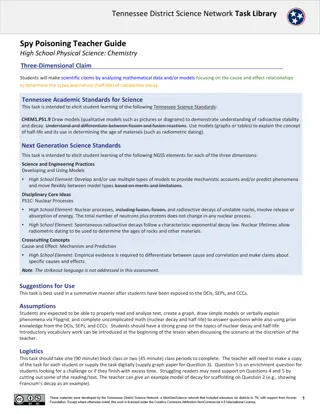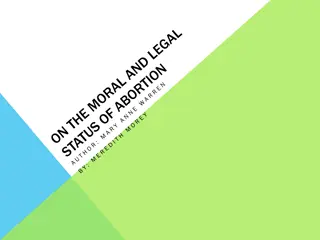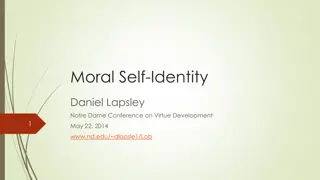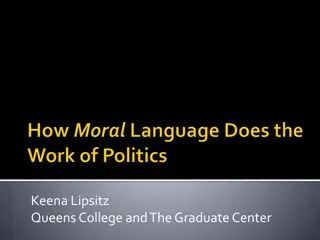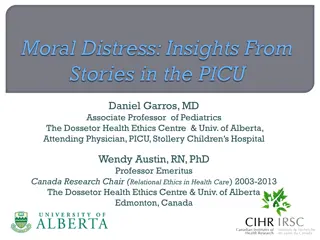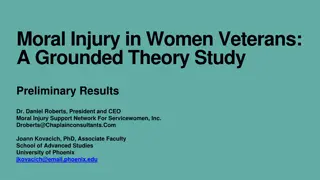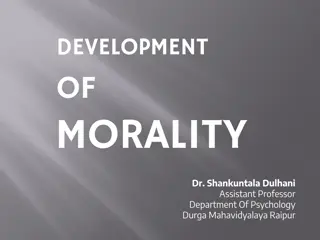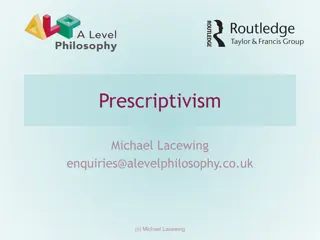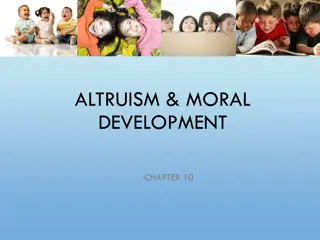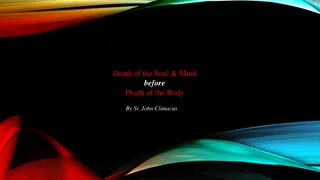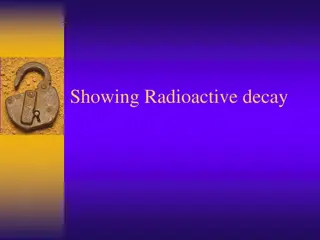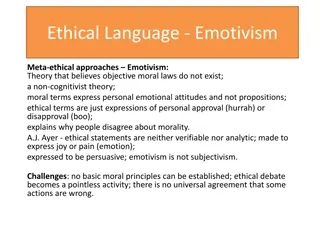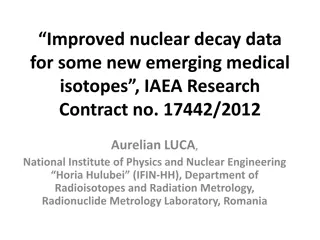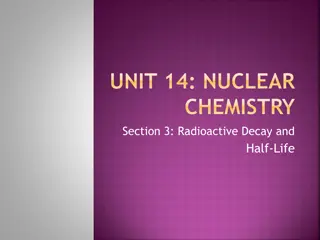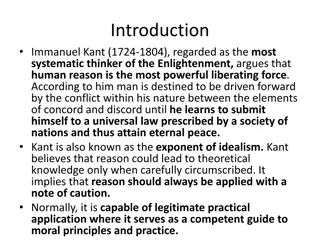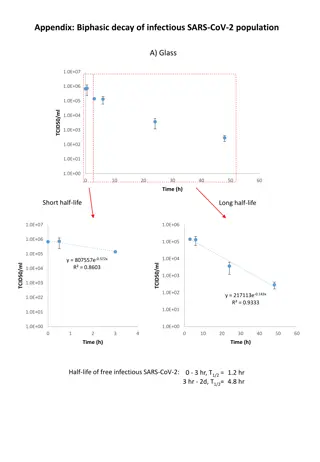Uncovering the Violent History of Capitalistic Enclosures
Explore the historical context of capitalist enclosures, their violent impacts on peasants, and the moral justifications used to conceal these atrocities. Delve into how economic narratives created moral bubbles to justify violent acts, as examined through the lens of Marx's analysis. Unveil the par
1 views • 11 slides
Understanding Exponential Decay in Ibuprofen Dosage
Explore the concept of exponential decay using an example of ibuprofen dosage elimination from the bloodstream. Learn how to calculate the remaining dosage at different time intervals based on the decay rate. Discover the relation between the initial dosage, elimination rate, and time passed.
2 views • 22 slides
Understanding Forgetting: Theories and Influence on Memory Recall
Forgetting is a complex phenomenon influenced by theories such as Decay Theory, Interference Theory, and Motivated Forgetting. The Ebbinghaus forgetting curve highlights how memories fade over time. Decay Theory suggests memories decay over time, while Interference Theory explains how old and new me
0 views • 25 slides
Understanding Kohlberg's Stages of Moral Development
Kohlberg's stages of moral development, built upon Piaget's psychological theory, outline six developmental stages of moral reasoning, with each stage offering a higher level of response to moral dilemmas. Kohlberg focused on justice in moral development and emphasized the importance of how individu
0 views • 19 slides
Understanding Moral Development and Moral Reasoning
Moral development involves an individual's sense of right and wrong, influenced by family, school, friends, and societal environment. Children learn moral concepts from interactions with parents, teachers, peers, and society, shaping their understanding of good and bad. Additionally, moral reasoning
0 views • 13 slides
Exploring Radioactive Decay: A Half-Life Lab Simulation
Explore the concept of radioactive decay through a virtual lab simulation involving strontium-90 (Sr-90) and yttrium-90 (Y-90) isotopes. Witness the decay process over multiple half-lives as unstable atoms transform into stable nuclei. Dive into the intricacies of half-life measurements and the vast
0 views • 10 slides
Understanding Radioactivity: A Comprehensive Overview
Radioactivity is the spontaneous decay of unstable atomic nuclei, emitting alpha, beta, or gamma rays. This phenomenon is regulated by Massachusetts laws, with institutions like Clark University licensed for responsible use. Alpha decay involves emission of helium nuclei, while beta decay releases e
0 views • 39 slides
Understanding Radiation and Radioactivity in Science
Radiation is energy in transit, while radioactivity is the emission of ionizing radiation by materials. This process involves ionization, which removes electrons from atoms, leading to various nuclear decay processes such as alpha decay, beta decay, gamma-ray emission, positron decay, electron captu
0 views • 80 slides
Moral Responsibility and Free Will Implications in a Contemporary Context
This text delves into the implications of free will and libertarianism on moral responsibility, examining the ideas of various philosophers and thinkers such as Pelagius, Arminius, Sartre, and more. It explores the concepts of moral agency, determinism, normative ethics, religious beliefs, and the c
5 views • 12 slides
Understanding Emotivism in Ethical Philosophy
Emotivism is a meta-ethical theory that rejects objective moral laws, instead positing that moral terms express personal emotional attitudes, not universal truths. Influenced by A.J. Ayer and rejecting naturalism, this theory suggests that ethical statements are not objective propositions but rather
0 views • 28 slides
Exploring Nuclear Equations and Beta Decay in Physics
Understanding the development of scientific theories like beta decay and nuclear equations through the work of Enrico Fermi and Chien-Shiung Wu. Discover the collaborative nature of scientific progress, where experiments validate theories and correct errors. Scientists worldwide, including George Ga
0 views • 7 slides
Reflections of Decay: Edgar Allan Poe's Dark Journey
The content delves into the exploration of decay within the soul of a person and how it might manifest in their personality, clothing, lodging, and outer appearance. Through a series of thought-provoking questions, literary excerpts, and historical insights, the essence of decay and its potential ma
0 views • 11 slides
Challenges and Opportunities of Moral Revolution in Indonesia
The need for a moral revolution in Indonesia to address societal issues like corruption, conflict, and intolerance. Contrasting mental and moral revolutions, the focus is on behavior change to build a humane society with healthy moral values. Initiatives and discussions highlight the urgency of tran
0 views • 13 slides
Understanding Moral Elevation in PTSD and Moral Injury
The research by Dr. Adam McGuire explores the role of moral elevation in PTSD and moral injury, emphasizing how witnessing virtuous behaviors triggers emotional and physical responses leading to a desire for imitating virtuous acts. By integrating prosocial emotions into trauma treatment, the positi
0 views • 13 slides
Understanding Nuclear Decays and Reactions in Stellar Astrophysics
Nuclear decays and reactions, driven by weak interactions, are vital in stellar astrophysics. Various processes like bound-state beta-decay impact nucleosynthesis and cosmochronology. Specific processes in stars involve capture reactions, electron capture, and neutrino-nucleus interactions. Stellar
0 views • 22 slides
Investigating Agent Z's Poisoning: A Case of Radioactive Decay
Agent Z, a double spy, was poisoned with Polonium-210, a heavy, radioactive element. This task challenges students to analyze the cause of his death using concepts of nuclear decay and half-life modeling based on provided data and models. The scenario involves understanding the effects of radioactiv
0 views • 14 slides
Understanding Humanity and Moral Community in the Context of Abortion Ethics
Exploring the complex ethical considerations surrounding abortion, this discussion delves into determining the humanity of a being, defining the moral community based on traits of personhood, fetal development, and the right to life. The arguments include the morality of abortion, the definition of
0 views • 9 slides
Challenges to Moral Anti-Realism: Objections and Responses
The article explores objections to moral anti-realism, including moral nihilism, condemning immorality, and the notion of moral progress in the absence of moral reality. It addresses concerns about the justification for interfering with others' behavior, the relationship between moral beliefs and ob
0 views • 6 slides
Understanding Moral Self-Identity Development
Situating moral self-identity within ethical theory and developmental psychology, this overview explores the centrality of morality within the self-concept. It discusses the chronic accessibility of moral schemas, the importance of strong evaluation in moral behavior, and the connection between mora
0 views • 33 slides
Understanding Moral and Constitutional Values in Relation to Judiciary
Explore the concepts of moral values and constitutional values, emphasizing their importance in decision-making processes and societal norms. Discover the stages of moral development and delve into constitutional values such as sovereignty, socialism, secularism, democracy, justice, liberty, equalit
0 views • 9 slides
Analysis of Moral Language in Political Communication
Explore how Republican and Democratic elites use distinctive moral language and its impact on voters in the context of the 2012 election data. Discover the application of Moral Foundations Theory in understanding political differences in the United States and how moral intuitions influence public op
0 views • 13 slides
The Influence of Disgust on Moral Behavior in Psychological Research
Explore the impact of disgust on moral behavior through various studies, including moral dilemmas and criteria for moral judgment. Research delves into how disgust affects decision-making processes related to moral dilemmas and helping behavior. Discover the connection between physical disgust and i
0 views • 16 slides
Understanding Moral Distress in Healthcare
This content discusses the concept of moral distress in healthcare, defined as the pain and anguish experienced when one knows the right thing to do but faces internal or external barriers preventing action. It explores the implications of moral distress on healthcare practitioners and emphasizes th
0 views • 25 slides
Insights on Moral Injury Among Women Veterans: Preliminary Study Findings
Preliminary results from a grounded theory study on moral injury in U.S. women veterans reveal themes such as sexual assault, hostile work environments, and more. Participants shared their experiences, highlighting the nature of moral injury they faced, distinguishing between various forms of discri
0 views • 21 slides
Understanding Moral Development: Insights and Perspectives
Morality is the belief in right behavior accepted by society. It involves moral behavior, feelings, and judgments. Moral development evolves from childhood to adulthood, influenced by experiences and challenges. Freud's id, ego, and superego theory and Skinner's behaviorism contribute to our underst
0 views • 12 slides
Exploring Moral Judgments and Prescriptive Meaning in Ethics
This content delves into non-cognitivism, Hare’s prescriptivism, and moral anti-realism to understand what we do when making moral judgments. It discusses prescriptive meaning, the concept of good, and how moral language guides actions. The objections raised regarding moral language's functions, p
0 views • 9 slides
Understanding Altruism and Moral Development Theories
Explore the components of morality, theories of moral development by prominent psychologists like Piaget and Kohlberg, and the stages of moral development in individuals. Learn about moral affect, reasoning, and behavior as integral aspects shaping one's ethical framework and decision-making process
0 views • 40 slides
Reflections on Insensibility and Spiritual Decay by St. John Climacus
St. John Climacus delves into the dangers of insensibility, highlighting how it leads to a numbed spirit, negligence, and a loss of feeling. He emphasizes the detrimental effects on the soul and mind, portraying individuals who preach virtues but fail to live by them, succumbing to hypocrisy and mor
0 views • 8 slides
Importance of Oral Hygiene and Preventing Tooth Decay in Children
Understanding the significance of oral hygiene and preventing tooth decay in children is crucial for their overall health. By learning about dental plaque, causes of tooth decay, effective teeth brushing techniques, and the impact of sugary foods and drinks, children can take steps to maintain good
0 views • 21 slides
Analysis of Tune Variation and Decay in Large Hadron Collider
This analysis focuses on the tune variation and decay of the bare machine tune in the Large Hadron Collider. It covers the evolution of the bare tune, analysis of the tune decay after injection, fitting of decay constants, and data extraction from 2015. The study includes insights into beam commissi
0 views • 16 slides
Understanding Compound Growth and Decay Through Examples
Compound growth and decay, specifically compound interest, involve calculating interest on a changing total amount over time. This concept is illustrated through various examples and equations, showcasing how investments or values increase or decrease with each period. Learn how to solve problems re
0 views • 9 slides
Understanding Radioactive Decay and Isotopes in Chemistry
Explore the fascinating world of radioactive decay, isotopes, and nuclear transformations in this educational resource. From reviewing atomic numbers to illustrating alpha and beta decay processes, discover the fundamental principles behind these phenomena with detailed explanations and visuals. Del
0 views • 17 slides
Friedrich Nietzsche's Genealogy of Morals: Uncovering the Evolution of Moral Values
Friedrich Nietzsche critiques traditional philosophy for overlooking the historical development of moral concepts. He argues that moral judgments were initially based on strength and power, later evolving into the dichotomy of master and slave morality. By tracing the genealogy of moral terms, Nietz
0 views • 10 slides
Understanding Emotivism: A Non-Cognitivist Theory in Ethics
Emotivism is a meta-ethical theory that posits the absence of objective moral laws, suggesting moral terms express personal emotional attitudes rather than propositions. Influenced by philosophers like A.J. Ayer and Hume, it challenges the existence of basic moral principles and universal agreement
0 views • 23 slides
Enhanced Nuclear Decay Data for Medical Isotopes Research
Improved nuclear decay data for emerging medical isotopes was evaluated as part of an IAEA research contract. The process involved reviewing previous evaluations, gathering experimental data, compiling decay data sets, and disseminating results. Challenges at IFIN-HH/LMR included limited funding and
0 views • 32 slides
Understanding Radioactive Decay and Half-Life in Nuclear Chemistry
Exploring the concept of radioactive decay and half-life in nuclear chemistry, this content covers the types of nuclear radiation, alpha decay of Uranium, and the significance of half-life in determining the decay of radioactive substances such as Carbon-14. An example with Fluorine-18 illustrates t
0 views • 9 slides
Kant's Moral Philosophy: Reason, Freedom, and the State
Immanuel Kant, a prominent Enlightenment thinker, emphasizes the liberating power of human reason in guiding individuals towards moral principles and practices. Kant's moral philosophy centers on treating each person as an end-in-itself, driven by the good will informed by reason. His concept of mor
0 views • 14 slides
Forms of Moral Reasoning and Ethics in Decision-Making
Explore the main forms of moral reasoning in ethical decision-making, including virtue ethics, deontological reasoning, and teleological reasoning. Understand the importance of developing ethical virtues and principles in guiding behavior. Delve into examples of reasoning from virtue and deontologic
0 views • 28 slides
Treatement of Tooth Decay - Saraf Dental Clinic
Are you troubled by tooth decay? Visit Dr. Shreya Saraf, an expert in Periodontology, located at Railway Station Road, Satna, Madhya Pradesh. Tooth decay is caused by poor oral hygiene, sugary diets, and lack of dental care. Get advanced, personalize
2 views • 4 slides
Biphasic Decay of Infectious SARS-CoV-2 Population
This study analyzes the biphasic decay of infectious SARS-CoV-2 populations on different surfaces. The data shows variations in the decay rates of the virus on materials such as glass, banknotes, stainless steel, plastic, and mask layers. The findings reveal differing half-lives and decay patterns,
0 views • 6 slides

